One number at a time
Carlos Barredo is part of the Liberty Seguros-Würth team that shared the spotlight alongside the...
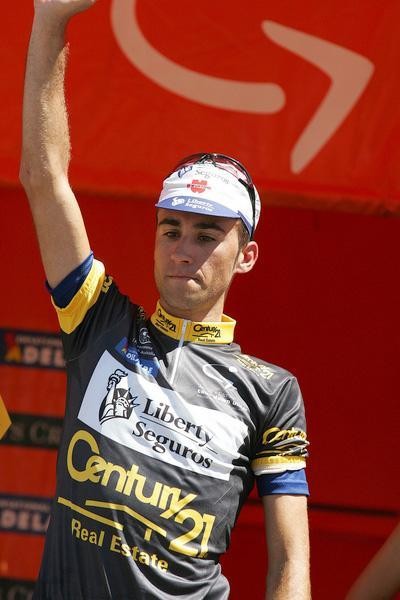
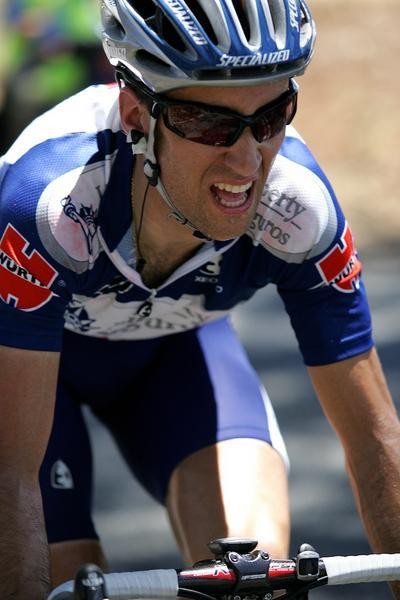
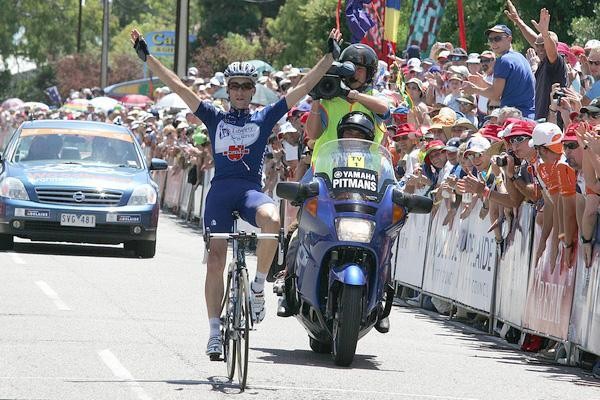
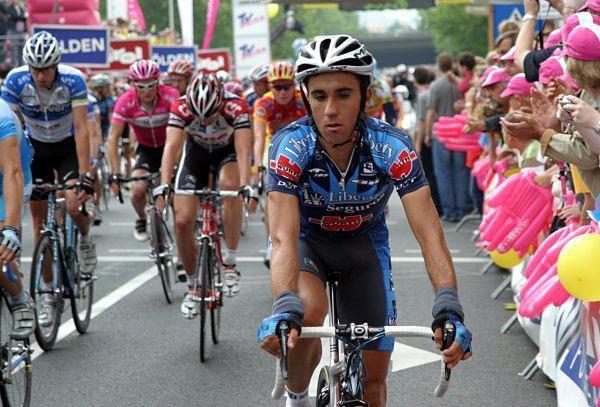
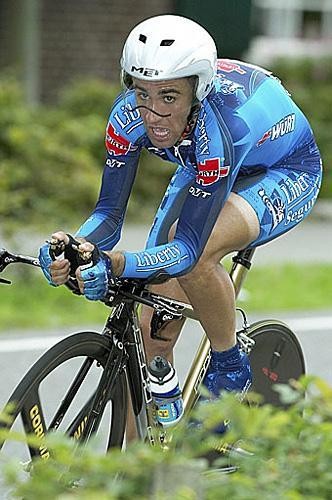
An interview with Carlos Barredo, February 2, 2006
Carlos Barredo is part of the Liberty Seguros-Würth team that shared the spotlight alongside the Ag2R juggernaut at this year's Jacob's Creek Tour Down Under, with the young Spaniard taking a win on stage 3 and featuring in the action all week. Cyclingnews' Hernan Alvarez spoke with Barredo about the heat in Australia, his desire to be a classics rider and a collection very close to his heart.
Liberty Seguros-Würth's Carlos Barredo soloed into Yankalilla on stage 3 of this year's Jacob's Creek Tour Down Under to take his second victory as a professional, his first one coming in stage 3 of the Vuelta a Asturias in 2004. Hailing from Oviedo and living in the seaside city of Gijon, Barredo had the conditioning to tolerate the tremendous heat very well during Australia's premier stage race, and he needed it during his brave effort on January 20. With the Tour of Flanders as his greatest dream and hopes of playing a big role in the Belgian races some day, Barredo is a rider to look out for.
Cyclingnews: How was that victory in Yankalilla?
Carlos Barredo: Well...it was a victory I searched for last year; there were many "shots hitting the crossbar", as I used to say, and I was really eager to win. It's my second win as a professional. It's a very nice win because the atmosphere at the Tour Down Under, especially in the stage finishes, is beautiful. There were many people - a great atmosphere.
CN: The heat seemed to be a key factor those days in South Australia, right? The temperature reached 44 degrees Celsius the day you won stage 3...
CB: Yes, and other days were hotter. The truth is that it was a factor that was crucial in the race. Except for the Australians - and not all of them, because some were in Europe also - all of the riders who came from Europe were and are in the middle of winter. Today, for example, I trained in my town with 3 degrees Celsius temperatures and of course you realise that there is 40 degrees difference - that affects you a lot. We were there one week before the start and, little by little, my body got used to the weather. Then on the road we realised how hot it was, but it was bearable.
Get The Leadout Newsletter
The latest race content, interviews, features, reviews and expert buying guides, direct to your inbox!
CN: Despite being from Northern Spain, the heat didn't seem to bother you too much.
CB: No, it wasn't a handicap. I think year after year heat affects me less. Some years ago, when I was an amateur and when I was a child, heat affected me more. Now I hardly ride in Asturias, only if I'm training at home, but when the season starts, I'm racing outside my region almost all the time, and the weather is hotter. I think my body is now more used to it and it wasn't really a factor that was against me.
CN: What about cold? I suppose it's not a problem for you.
CB: The cold is actually affecting me more these two days that I've spend at home than the heat in Australia. The body adapts worse to cold, but I'm also used to cold because I trained with it here the whole winter and I have to train one more month with it, so I think it's all a question of adaptation.
CN: Manolo Saiz wasn't with you as team director, Marino Lejarreta was instead. How was Marino as a director?
CB: Marino is a great director and a great person. One is very comfortable with him; he makes things clear in the meetings, but then in the race he leaves more freedom to the rider. He's not "over" the rider the whole day because he knows we are professionals. He knows that each of us is responsible for our actions. I think he is a great director and we felt very well with him during the 15 days. Neil Stephens was around there even though he wasn't in the director's role; he was working with the Tour Down Under organisation. He will be our director later this year, however.
CN: For Liberty Seguros, it was a super performance at the Tour Down Under, wasn't it?
CB: Yes, we lacked what we did last year - the win with Luis Leon [Sanchez]. I think we tried for it the day in Willunga; we tried to drop Simon Gerrans [Ag2r Prevoyance] but it was difficult. In the final Luis was second, we won three stages and the truth is that for Allan [Davis] to win in Australia...I think he hadn't won in Australia before, just criteriums, and I think it was important for him to win. Not only once but twice. The last day that he prevailed in the finish line over [Robbie] McEwen will certainly give Allan a lot of confidence for the bunch sprints this year. Three stage wins and a second place in the overall classification for the team, there's almost no better way to start the year for us. We didn't win the team overall [classification] like last year, but we are pretty happy.
CN: How did you cope with the jet lag - both from Spain to Australia and vice versa?
CB: From Spain to Australia, I dealt well with it like last year. The first day I was somehow disoriented, but later I adapted easily. But the way back home, also like last year, it was harder. For example today I woke up at 6 in the morning and I couldn't go back to sleep. Yesterday it was 5am. I hope tomorrow I wake up at 7 and in two or three days, it becomes like every day - I'm recovering one hour each day.
This afternoon I was talking to my teammates from Spain who were there and are here now; Luis Leon, [Ivan] Santos, [Jose Joaquin] Rojas. Everyone told me the same thing: that between 4 and 6 in the morning we were all waking up. The trip back here is very hard. When we went to Australia we stopped in Kuala Lumpur and spent 10-12 hours in a hotel. We went to the gym and it seemed we all dealt with it in a different way. But when we came back here that we took a non-stop flight, so it affected me quite a bit.
CN: I read on your website that you collect the numbers you wear in races...
CB: That's right. I collect all the numbers. I've always kept the number since I was an amateur; they used to give two [per day] and I always keep one. It's an odd habit that I have.
CN: How many numbers do you have already?
CB: I can't tell you exactly, but I have around 60 numbers from last year and about 60 from the previous year [2004], but I've never taken the time to count them.
CN: The most valuable is the one you wore in your first professional win at the Vuelta a Asturias?
CB: Yes, I think it is the most valuable for me. There's another I like a lot - the one I had from the first Spanish championship I rode when I start riding bicycles as a teenager; number 14. It brought me many good memories - I like number 14 because of that.
CN: In the long term, which are the main goals for your sporting career?
CB: My main goal is to keep improving day by day; I think that's the most important thing. I think that if you continue working and progressing, in the end results will come. In the long term, ever since I was a kid, I wanted to shine in races like the Tour of Flanders or Paris-Roubaix. I was also able to ride them, live them and know them a bit during my first two professional years. I think that if I keep on looking toward these two races for a few years, especially the Tour of Flanders, my goal can't be anything other than to try and shine some day and do something big in this race.
CN: How was that first Tour of Flanders that you rode in 2004? What do you remember about that race?
CB: I have a bittersweet memory. It was a windy day and I got into a breakaway that I helped to build with Michael Rich. When we were some more than five minutes ahead of the peloton I had a problem. My handlebars broke while I was riding a pave sector.
In the World Cup races, team cars couldn't follow riders who ride in a breakaway. There was a neutral car driving near us and the pedals they had weren't useful at all. I had to wait for the peloton to arrive, the peloton to pass and our car to give me [another] bike. I had to wait more than five, almost six minutes for my team car to arrive. Finally, I didn't finish.
I truly remember that race as bittersweet. Because I had expectations to go to the Tour of Flanders to try and finish and I think it was within my reach. I have more pleasant memories from last year's race because I was able to finish [in 41st position] and be a protagonist for part of it because I was in a breakaway. I now know it a bit more, which is the most important thing.
CN: How are you living the Roberto Heras affair inside the team? And how do you live it personally?
CB: We had a training camp in the winter and we were a bit worried about Roberto inside the team. We all hope that is a mistake and that he joins us again soon. Personally, my relationship with Roberto wasn't, let's say, close. He is a teammate but I didn't ride much with him because Roberto based the season on the big tours and I haven't ridden any big races yet. It was truly a hard hit for everyone because to win the Vuelta a España is, if not as important a race as the Tour de France, it is possibly the most important thing for my team as a Spanish squad. It's a disappointment and it hit hard. But, think we are coming through this all together as we demonstrated in the Tour Down Under. As I told you, I hope that everything gets fixed for Roberto soon and that he rejoins us.
CN: Apart from the Tour of Flanders, which are the races you plan to ride?
CB: The next race is the Vuelta a Valencia and then I'll do la Panne, Flanders, Gent-Wevelgem and Paris-Roubaix. Then I race Romandie, Switzerland, Volta a Catalunya and Euskal Bizikleta. Then there's a stop for the Tour [de France], rest and at the end of the season, if everything goes well, I'll do the Vuelta a España. I'd like to be strong in the month of April for the spring classics. To win in the classics is almost impossible, but the idea is to get to know them little by little. Then when you have physical and mental maturity you can try to do something big.